英语虚拟语气知识点梳理及练习(超详细)
- 格式:doc
- 大小:75.00 KB
- 文档页数:12

虚拟语气讲解和练习(附答案)概念理解一、动词的语气语气用来区别讲话人对某一行为或事情的看法和态度。
英语中的语气(mood)1.陈述语气Where there is a will, there's a way. 有志者事竟成。
Can you help me carry the box upstairs 你能帮我把箱子搬到楼上吗?How I missed the life in the countryside! 我多么想念乡村的生活啊!2.祈使语气Come this way, please! 请这边走。
Don't make any noise, will you 别吵,行吗?Do be careful when crossing the street. 过马路时一定要小心。
3.虚拟语气If I were a bird, I could fly in the air. 如果我是一只小鸟,我就能在空中飞行。
I wish it were spring all the year round. 但愿四季如春。
May good luck be yours! 祝你好运!知识清单清单一、条件句中的虚拟语气A.真实条件句If he doesn't come at 8, we won't wait for him. 如果他八点不来,我们就不等他了。
If a flood happened in the past, there was usually a great loss of life and property. 过去发生洪水的话,常有很大的生命和财产损失。
We shall go there unless it rains tomorrow. 如果明天不下雨,我们将去那里。
I'll let you use my bike on condition that you keep it clean. 如果你能保持车子干净,我就让你用我的自行车。
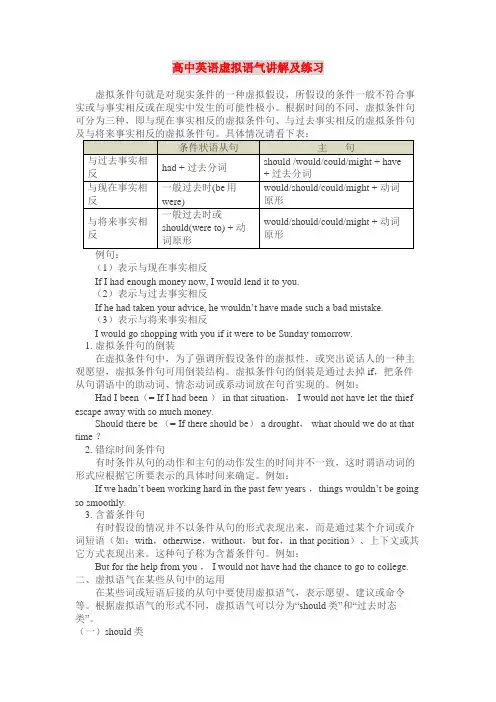
高中英语虚拟语气讲解及练习虚拟条件句就是对现实条件的一种虚拟假设,所假设的条件一般不符合事实或与事实相反或在现实中发生的可能性极小。
根据时间的不同,虚拟条件句可分为三种,即与现在事实相反的虚拟条件句、与过去事实相反的虚拟条件句(1)表示与现在事实相反If I had enough money now, I would lend it to you.(2)表示与过去事实相反If he had taken your advice, he wouldn’t have made such a bad mistake.(3)表示与将来事实相反I would go shopping with you if it were to be Sunday tomorrow.1. 虚拟条件句的倒装在虚拟条件句中,为了强调所假设条件的虚拟性,或突出说话人的一种主观愿望,虚拟条件句可用倒装结构。
虚拟条件句的倒装是通过去掉if,把条件从句谓语中的助动词、情态动词或系动词放在句首实现的。
例如:Had I been(= If I had been ) in that situation, I would not have let the thief escape away with so much money.Should there be (= If there should be) a drought, what should we do at that time ?2. 错综时间条件句有时条件从句的动作和主句的动作发生的时间并不一致,这时谓语动词的形式应根据它所要表示的具体时间来确定。
例如:If we hadn’t been working hard in the past few years ,thing s wouldn’t be going so smoothly.3. 含蓄条件句有时假设的情况并不以条件从句的形式表现出来,而是通过某个介词或介词短语(如:with,otherwise,without,but for,in that position)、上下文或其它方式表现出来。
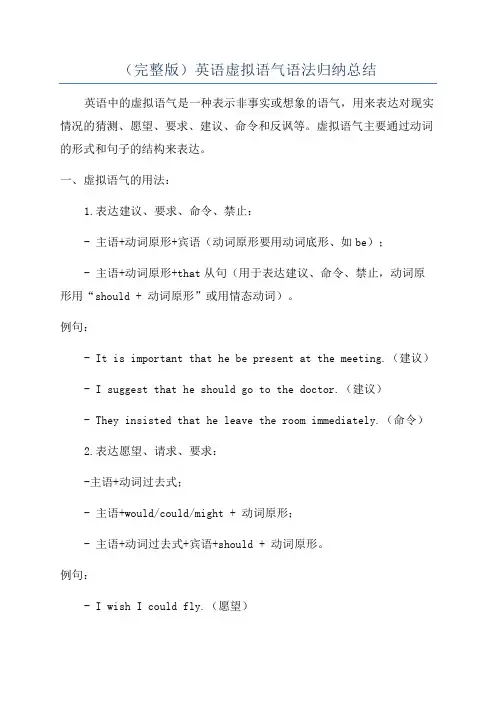
(完整版)英语虚拟语气语法归纳总结英语中的虚拟语气是一种表示非事实或想象的语气,用来表达对现实情况的猜测、愿望、要求、建议、命令和反讽等。
虚拟语气主要通过动词的形式和句子的结构来表达。
一、虚拟语气的用法:1.表达建议、要求、命令、禁止:- 主语+动词原形+宾语(动词原形要用动词底形、如be);- 主语+动词原形+that从句(用于表达建议、命令、禁止,动词原形用“should + 动词原形”或用情态动词)。
例句:- It is important that he be present at the meeting.(建议)- I suggest that he should go to the doctor.(建议)- They insisted that he leave the room immediately.(命令)2.表达愿望、请求、要求:-主语+动词过去式;- 主语+would/could/might + 动词原形;- 主语+动词过去式+宾语+should + 动词原形。
例句:- I wish I could fly.(愿望)- I would appreciate it if you could help me.(请求)3.表示虚拟条件:- If条件从句中的谓语动词用过去完成时,主句用would/should/might/could + have + 过去分词;- If条件从句中的谓语动词用过去时,主句用would/should/could + 动词原形。
例句:- If I had known his phone number, I would have called him.(虚拟条件)- If you had listened to me, we could have finished the project earlier.(虚拟条件)4.表达建议、要求、祝愿:- If only内部称述 + 主语 + 过去式。
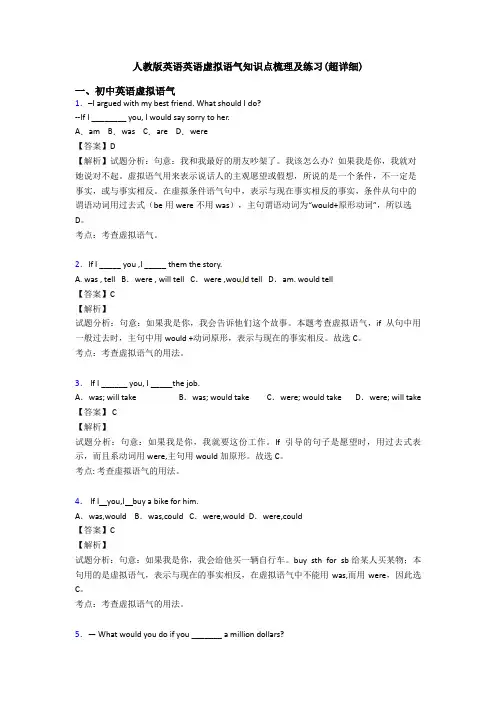
人教版英语英语虚拟语气知识点梳理及练习(超详细)一、初中英语虚拟语气1.–I argued with my best friend. What should I do?--If I ________ you, I would say sorry to her.A.am B.was C.are D.were【答案】D【解析】试题分析:句意:我和我最好的朋友吵架了。
我该怎么办?如果我是你,我就对她说对不起。
虚拟语气用来表示说话人的主观愿望或假想,所说的是一个条件,不一定是事实,或与事实相反。
在虚拟条件语气句中,表示与现在事实相反的事实,条件从句中的谓语动词用过去式(be用were不用was),主句谓语动词为“would+原形动词”,所以选D。
考点:考查虚拟语气。
2.If I _____ you ,I _____ them the story.A. was , tell B.were , will tell C.were ,wou ld tell D.am. would tell【答案】C【解析】试题分析:句意:如果我是你,我会告诉他们这个故事。
本题考查虚拟语气,if 从句中用一般过去时,主句中用would +动词原形,表示与现在的事实相反。
故选C。
考点:考查虚拟语气的用法。
3. If I ______ you, I _____the job.A.was; will take B.was; would take C.were; would take D.were; will take 【答案】 C【解析】试题分析:句意:如果我是你,我就要这份工作。
If引导的句子是愿望时,用过去式表示,而且系动词用were,主句用would加原形。
故选C。
考点: 考查虚拟语气的用法。
4. If I you,I buy a bike for him.A.was,would B.was,could C.were,would D.were,could【答案】C【解析】试题分析:句意:如果我是你,我会给他买一辆自行车。
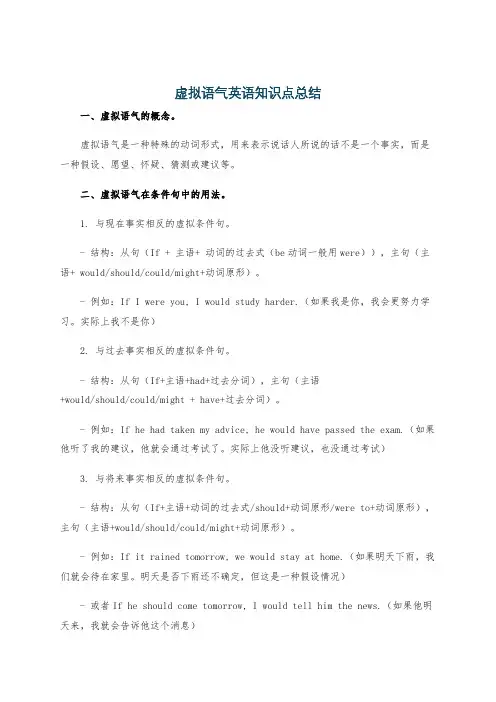
虚拟语气英语知识点总结一、虚拟语气的概念。
虚拟语气是一种特殊的动词形式,用来表示说话人所说的话不是一个事实,而是一种假设、愿望、怀疑、猜测或建议等。
二、虚拟语气在条件句中的用法。
1. 与现在事实相反的虚拟条件句。
- 结构:从句(If + 主语+ 动词的过去式(be动词一般用were)),主句(主语+ would/should/could/might+动词原形)。
- 例如:If I were you, I would study harder.(如果我是你,我会更努力学习。
实际上我不是你)2. 与过去事实相反的虚拟条件句。
- 结构:从句(If+主语+had+过去分词),主句(主语+would/should/could/might + have+过去分词)。
- 例如:If he had taken my advice, he would have passed the exam.(如果他听了我的建议,他就会通过考试了。
实际上他没听建议,也没通过考试)3. 与将来事实相反的虚拟条件句。
- 结构:从句(If+主语+动词的过去式/should+动词原形/were to+动词原形),主句(主语+would/should/could/might+动词原形)。
- 例如:If it rained tomorrow, we would stay at home.(如果明天下雨,我们就会待在家里。
明天是否下雨还不确定,但这是一种假设情况)- 或者If he should come tomorrow, I would tell him the news.(如果他明天来,我就会告诉他这个消息)- 以及If I were to see her tomorrow, I would give her the book.(如果我明天见到她,我就会把书给她)三、虚拟语气在宾语从句中的用法。
1. wish后的宾语从句。
- 表示与现在事实相反的愿望,从句谓语动词用过去式(be动词用were)。
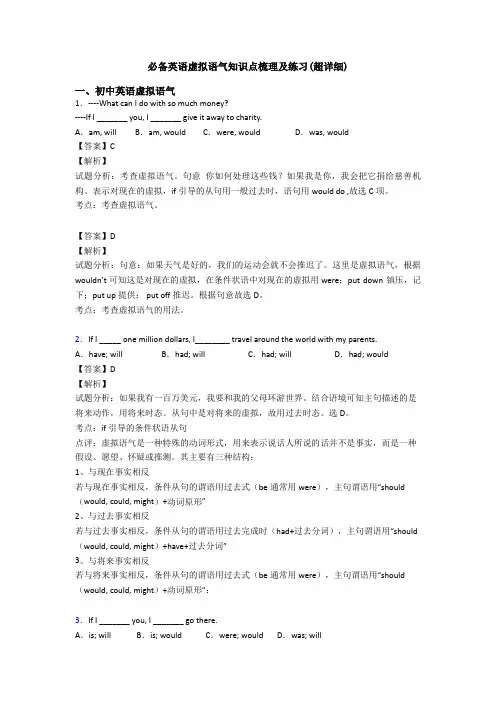
必备英语虚拟语气知识点梳理及练习(超详细)一、初中英语虚拟语气1.----What can I do with so much money?----If I _______ you, I _______ give it away to charity.A.am, will B.am, would C.were, would D.was, would【答案】C【解析】试题分析:考查虚拟语气。
句意你如何处理这些钱?如果我是你,我会把它捐给慈善机构。
表示对现在的虚拟,if引导的从句用一般过去时,语句用would do ,故选C项。
考点:考查虚拟语气。
【答案】D【解析】试题分析:句意:如果天气是好的,我们的运动会就不会推迟了。
这里是虚拟语气,根据wouldn’t可知这是对现在的虚拟,在条件状语中对现在的虚拟用were;put down 镇压,记下;put up提供; put off推迟。
根据句意故选D。
考点:考查虚拟语气的用法。
2.If I _____ one million dollars, I________ travel around the world with my parents. A.have; will B.had; will C.had; will D.had; would【答案】D【解析】试题分析:如果我有一百万美元,我要和我的父母环游世界。
结合语境可知主句描述的是将来动作,用将来时态。
从句中是对将来的虚拟,故用过去时态。
选D。
考点:if引导的条件状语从句点评:虚拟语气是一种特殊的动词形式,用来表示说话人所说的话并不是事实,而是一种假设、愿望、怀疑或推测。
其主要有三种结构:1、与现在事实相反若与现在事实相反,条件从句的谓语用过去式(be通常用were),主句谓语用“should (would, could, might)+动词原形”2、与过去事实相反若与过去事实相反,条件从句的谓语用过去完成时(had+过去分词),主句谓语用“should (would, could, might)+have+过去分词”3、与将来事实相反若与将来事实相反,条件从句的谓语用过去式(be通常用were),主句谓语用“should (would, could, might)+动词原形”:3.If I _______ you, I _______ go there.A.is; will B.is; would C.were; would D.was; will【解析】本题考查虚拟语气,if引导的与现在事实相反的虚拟语气。
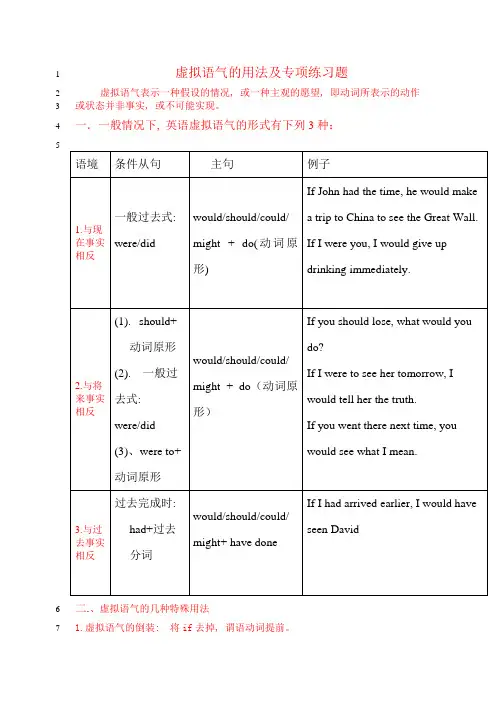
虚拟语气的用法及专项练习题1虚拟语气表示一种假设的情况, 或一种主观的愿望, 即动词所表示的动作2或状态并非事实, 或不可能实现。
3一.一般情况下, 英语虚拟语气的形式有下列3种:45二.、虚拟语气的几种特殊用法61.虚拟语气的倒装: 将if去掉, 谓语动词提前。
7●如:8I..wer.you..woul.giv.u.drinking.=Wer..you..woul.giv.u.drinking.9●I..ha.arrive.earlier..woul.hav.see.David..Ha..arrive.earlier..woul.hav.se10e.David.112. 有时条件从句中的动作和主句中的动作发生的时间不一致, 如:12If he had followed the doctor’s advice, he would be quite all right now.13(if从句是对过去的虚拟, 主句是对现在的虚拟。
)14If I were you, I would have gone home.15(if从句是对现在的虚拟, 主句是对过去的虚拟。
)1617注意: 在此结构中that不可省略;should省不省均可。
18He suggested that they (should ) stop smoking.19上述动词的名词形式出现时, that 引导的从句仍用虚拟语气。
20He made a request that they (should ) stop smoking.21注意:22* insist有两个意思, 当表示“坚持让某人做某事”(含命令口吻)时, 23that从句用虚拟, 如: He insists that we (should) go home now.24当表示“坚持某种说法”时, that从句用陈述语气。
25He insists that he is right.2627It is important that you (should) follow the doctor’s o rders.28It is right that you should have done your homework.29注意: wish与hope接宾语从句的区别在于: hope表示一般可以实现的30希望, 宾语从句用陈述语气。
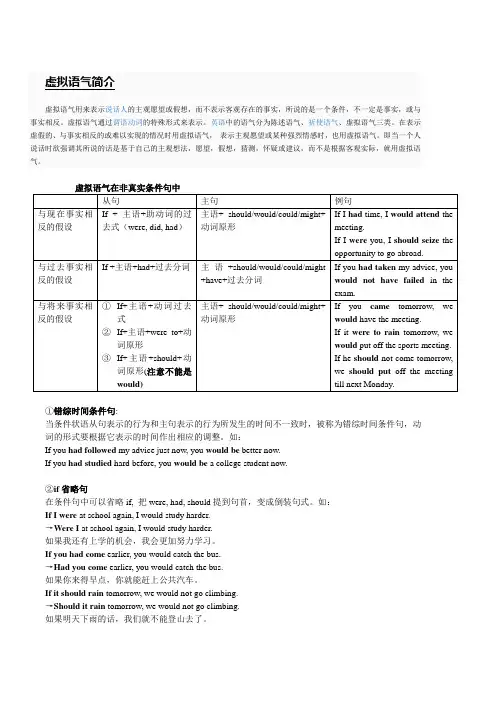
虚拟语气简介虚拟语气用来表示说话人的主观愿望或假想,而不表示客观存在的事实,所说的是一个条件,不一定是事实,或与事实相反。
虚拟语气通过谓语动词的特殊形式来表示。
英语中的语气分为陈述语气、祈使语气、虚拟语气三类。
在表示虚假的、与事实相反的或难以实现的情况时用虚拟语气,表示主观愿望或某种强烈情感时,也用虚拟语气。
即当一个人说话时欲强调其所说的话是基于自己的主观想法,愿望,假想,猜测,怀疑或建议,而不是根据客观实际,就用虚拟语气。
①错综时间条件句:当条件状语从句表示的行为和主句表示的行为所发生的时间不一致时,被称为错综时间条件句,动词的形式要根据它表示的时间作出相应的调整。
如:If you had followed my advice just now, you would be better now.If you had studied hard before, you would be a college student now.②if省略句在条件句中可以省略if, 把were, had, should提到句首,变成倒装句式。
如:If I were at school again, I would study harder.→Were I at school again, I would study harder.如果我还有上学的机会,我会更加努力学习。
If you had come earlier, you would catch the bus.→Had you come earlier, you would catch the bus.如果你来得早点,你就能赶上公共汽车。
If it should rain tomorrow, we would not go climbing.→Should it rain tomorrow, we would not go climbing.如果明天下雨的话,我们就不能登山去了。
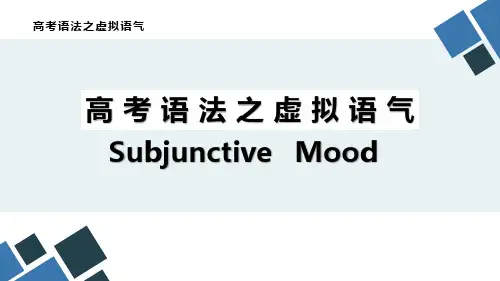
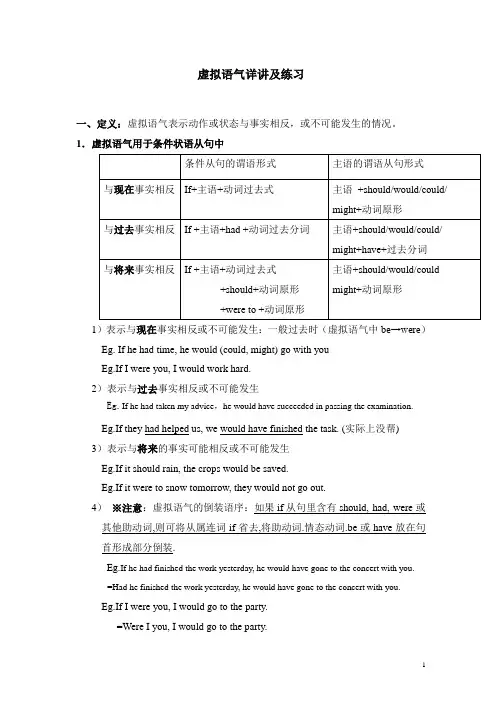
虚拟语气详讲及练习一、定义:虚拟语气表示动作或状态与事实相反,或不可能发生的情况。
1.虚拟语气用于条件状语从句中1)表示与现在事实相反或不可能发生:一般过去时(虚拟语气中be→were)Eg. If he had time, he would (could, might) go with youEg.If I were you, I would work hard.2)表示与过去事实相反或不可能发生Eg.If he had taken my advice,he would have succeeded in passing the examination.Eg.If they had helped us, we would have finished the task. (实际上没帮)3)表示与将来的事实可能相反或不可能发生Eg.If it should rain, the crops would be saved.Eg.If it were to snow tomorrow, they would not go out.4)※注意:虚拟语气的倒装语序:如果if从句里含有should, had, were或其他助动词,则可将从属连词if省去,将助动词.情态动词.be或have放在句首形成部分倒装.Eg.If he had finished the work yesterday, he would have gone to the concert with you.=Had he finished the work yesterday, he would have gone to the concert with you.Eg.If I were you, I would go to the party.=Were I you, I would go to the party.Eg.If it should rain tomorrow, I would stay at home=Should it rain tomorrow, I would stay at home.2. 虚拟语气在宾语从句中的用法➢在动词wish后的宾语从句中,表示与现在或过去的事实相反,或对将来的主观愿望,从句通常省略连词that。
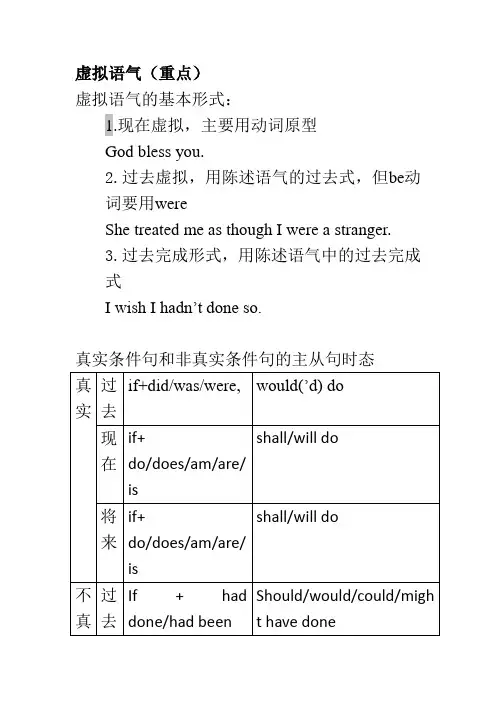
虚拟语气(重点)虚拟语气的基本形式:1.现在虚拟,主要用动词原型God bless you.2.过去虚拟,用陈述语气的过去式,但be动词要用wereShe treated me as though I were a stranger.3.过去完成形式,用陈述语气中的过去完成式I wish I hadn’t done so.真实条件句和非真实条件句的主从句时态What would you do if you were in his place?If he had spent more time thinking, he might have done it better.If I were to make the design, I could choose another color.*省略if的虚拟形式——语序要倒装。
Were I Tom, I would refuse.Should they come to us, I should ask them some questions.*含蓄条件句——不用条件从句的形式,而用别的方式,常用with, without, but for等引导。
Without heat and sunlight plants on the earth would not grow well.But for my classmates’ help, I would not have finished the work in time.*以wish引导的宾语从句,表示对现在或将来的愿望:wish +从句(过去时)表示对过去的愿望:wish +从句(过去完成时)I didn’t go the party, but I do wish I ___ there. A.Were B. would be C. had been D. will bePeter wishes that he ___ law instead of literature when he was in college.A.Could studyB. studiedC. had studiedD. would study*if only + 过去时对现在或将来的虚拟If only +过去完成时对过去的虚拟If only the alarm clock had rung.If only I were rich.*would rather (’d rather) + 句子(过去时)(重点)I am too busy these days. I would rather all of you ___ next month for a dinner.eB. would comeC. cameD. havecome*it is time (that)…, it is high time (that)… 谓语动词用过去时,表示该做二未做的是,意思是“该……了,早该……了”Let’s finish our homework in a few seconds; it’s time we played football.Don’t you think it is time you gave up smoking?*在as if, as though引导的从句中,跟wish引导的从句中的动词形式变化相同。
【英语】虚拟语气知识点梳理及经典练习(超详细)一、初中英语虚拟语气1.—A student in my class said to me, “if I ______our math teacher, I_____ make math learning easier and more interesting instead of giving the kids much homework to do every day.”A.were, would B.am, will C.was, would D.were, will【答案】A【解析】试题分析:句意:我班里的一个学生对我说:如果我是数学老师,我会使数学学习更简单有趣,而不是每天给学生许多作业去做。
虚拟语气是一种特殊的动词形式,用来表示说话人所说的话并不是事实,而是一种假设、愿望、怀疑或推测。
其主要有三种结构:1、与现在事实相反若与现在事实相反,条件从句的谓语用过去式(be通常用were),主句谓语用“should (would, could, might)+动词原形”2、与过去事实相反若与过去事实相反,条件从句的谓语用过去完成时(had+过去分词),主句谓语用“should (would, could, might)+have+过去分词”3、与将来事实相反若与将来事实相反,条件从句的谓语用过去式(be通常用were),主句谓语用“should (would, could, might)+动词原形”。
该句描述的是与现状相反的事实故选A。
考点:考查虚拟语气。
2.The air pollution is worse and worse. The government suggests that people ____ to work by subway or by bus.A.go B.goes C.going D.to go【答案】A【解析】【详解】句意:空气污染越来越糟糕。
虚拟语气一、考点聚焦1、虚拟语气用于条件状语从句中(1)表示与现在事实相反的假设,条件状语从句中的谓语动词用“过去式(be动词的过去式用were)”,而主句中的谓语动词用“would / should/ could / might + 动词原形”。
如:If I were a boy, I would join the army.If the had time, she should go with you.(2)表示与过去的事实相反,条件状语从句中的谓语动词用过去完成时,主句中的谓语动词则用“would / should / might / could + have +过去分词”。
如:If he had taken my advice, he would have succeeded in the competition.(3)表示与将来事实相反,条件状语从句中的谓语动词一般过去时或should(were to) + 动词原形,而主句中的谓语动词则用would / should/could might + 动词原形。
如;If it were to rain tomorrow, the football match would be put off.(4)当条件状语从句表示的行为和主句表示的行为所发生的时间不一致时,动词的形式要根据它所表示的时间作相应调整。
如:If they had worked hard, they would be very tired.(从句说的是过去,主句指的是现在)Were I a boy, I would join the army.Had he taken my advice, he would have succeeded.Were it not for the expense, I would go to Britain.2、虚拟语气用于名词性从句(1)虚拟语气在宾语从句中的运用。
(完整版)虚拟语气讲解及练习题(含答案和解释)虚拟语气讲解与练习黄志刚2013.10.一. 简介虚拟语气用来表示说话人的主观愿望或假想,而不表示客观存在的事实,所说的是一个条件,不一定是事实,或与事实相反。
虚拟语气通过谓语动词的特殊形式来表示。
英语中的语气分为陈述语气、祈使语气、虚拟语气在什么情况下用虚拟语气? 在表示虚假的、与事实相反的或难以实现的情况时用虚拟语气,表示主观愿望或表示某种强烈情感时,也用虚拟语气。
即当一个人说话时欲强调其所说的话是基于自己的主观想法,而不是根据客观实际,就用虚拟语气。
二. 虚拟语气在非真实条件状语从句中的用法1、真实条件状语从句与非真实条件状语从句真:eg . If he doesn’t hurry up, he will miss the bus. 如果他不快点,他将错过巴士。
( 真实条件状语)(不是虚拟语气)If he is free, he will ask me to tell stories. 如果他是空闲的,他会要求我讲故事。
(真实条件状语)(不是虚拟语气)非真:eg. If I were you, I would go at once.如果我是你,我马上就会去。
(非真实条件状语从句)If there were no air, people would die. 如果没有空气,人就会死亡。
(非真实条件状语从句)2、用法及动词形式1、表示与现在事实相反的情况,例1.If I were you, I would take an umbrella.如果我是你,我会带把伞。
(事实:我不可能是你) 2.If I knew his telephone number, I would tell you. 如果我知道他的电话号码,我就会告诉你。
(事实:不知道) 3.If there were no air orwater, there would be no living things on the earth. 如果没有水和空气,地球上就不会有生物。
虚拟语气一、知识框架二、知识梳理(一)语气的定义和种类l、语气:语气是动词的一种形式,它表示说话人对某一行为或事情的看法和态度。
2、语气的种类:(1)陈述语气: 表示动作或状态是现实的、确定的或符合事实的,用于陈述句、疑问句和某些感叹句。
如:We are not ready. 我们没准备好。
What a fine day it is!多好的天气啊!(2)祈使语气: 表示说话人的建议、请求、邀请、命令等。
如: Open the door, please。
请打开门。
(3)虚拟语气: 表示动作或状态不是客观存在的事实,而是说话人的主观愿望、假设或推测等。
如: If I were you, I should study English. 如果我是你,我就学英语了。
May you succeed! 祝您成功!(二)虚拟语气在条件从句中的用法条件句有两类,一类是真实条件句,一类是虚拟条件句。
如果假设的情况是有可能发生的,就是真实条件何。
在这种真实条件句中的谓语用陈述语气。
如果假设的情况是过去或现在都不存在的,或将来不大可能发生的,则是虚拟条件句。
If it doesn't rain tomorrow, we will go to the park.If he had seen you yesterday, he would have asked you about it. (事实上他昨天没见到你,因此也未能问你这件在含有虚拟条件句的复合句中,主句和从句的谓语都要用虚拟语气。
同步练习:1. If she had worked harder, she __________.A. would succeedB. had succeededC. should succeedD. would have succeeded2. If my lawyer ________ here last Saturday, he _________me from going.A. had been; would have preventedB. had been; would preventC. were; wouldD. were; would have prevented3. If he were here, he __________ us how to do it.A. toldB. would tellC. had toldD. have told4. If it_________rain next week,the farmers could still have a good harvest.A.shouldB.couldC.wouldD.mightKeys: DABA(三)虚拟条件句的特殊情况(1) 省略if的虚拟语气如果从句中含有were/ should/ had时,则可以把这三个词置于句首,省略if,采用倒装语序。
虚拟语气知识点梳理及经典练习(超详细)经典一、初中英语虚拟语气1. If I _______ you , I _______ do that .A.was , would B.were ; wouldn’tC.am , won’t D.were , won’t【答案】D【解析】试题分析:句意:如果我是你,我不会那样做。
本句是与现在事实相反的虚拟条件句,从句谓语用动词用过去式(be动词一般用were);主句用should(would,could,might)+ 动词原形。
故选D。
考点:虚拟条件句。
2.--------- Come and join us, Jim!---------- I’m sorry I can’t . If I _______ time, I would certainly go.A.will have B.have had C.had D.had had【答案】C【解析】试题分析:虚拟语气是一种特殊的动词形式,用来表示说话人所说的话并不是事实,而是一种假设、愿望、怀疑或推测。
判断是真实条件句还是非真实条件句。
只有在非真实条件句中才使用虚拟语气。
通过句子意思,看假设的条件是否能够实现,能够实现是真实条件句,不能使用虚拟语气;假设的条件不能实现则是非真实条件句,要用虚拟语气.判断这个假设是与哪个事实相反。
(1)、与现在事实相反若与现在事实相反,条件从句的谓语用过去式(be通常用were),主句谓语用“should (would, could, might)+动词原形”(2)、与过去事实相反若与过去事实相反,条件从句的谓语用过去完成时(had+过去分词),主句谓语用“should (would, could, might)+have+过去分词”(3)、与将来事实相反若与将来事实相反,条件从句的谓语用过去式(be通常用were),主句谓语用“should (would, could, might)+动词原形”:句意:吉姆,来加入我们吧!抱歉,我不能。